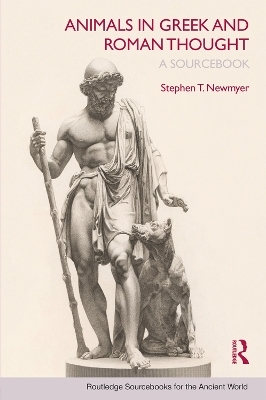
Animals in Greek and Roman Thought
A Sourcebook
Seiten
2010
Routledge (Verlag)
978-0-415-77335-5 (ISBN)
Routledge (Verlag)
978-0-415-77335-5 (ISBN)
Although reasoned discourse on human-animal relations is often considered a late twentieth-century phenomenon, ethical debate over animals and how humans should treat them can be traced back to the philosophers and literati of the classical world. From Stoic assertions that humans owe nothing to animals that are intellectually foreign to them, to Plutarch's impassioned arguments for animals as sentient and rational beings, it is clear that modern debate owes much to Greco-Roman thought.
Animals in Greek and Roman Thought brings together new translations of classical passages which contributed to ancient debate on the nature of animals and their relationship to human beings. The selections chosen come primarily from philosophical and natural historical works, as well as religious, poetic and biographical works. The questions discussed include: Do animals differ from humans intellectually? Were animals created for the use of humankind? Should animals be used for food, sport, or sacrifice? Can animals be our friends?
The selections are arranged thematically and, within themes, chronologically. A commentary precedes each excerpt, transliterations of Greek and Latin technical terms are provided, and each entry includes bibliographic suggestions for further reading.
Animals in Greek and Roman Thought brings together new translations of classical passages which contributed to ancient debate on the nature of animals and their relationship to human beings. The selections chosen come primarily from philosophical and natural historical works, as well as religious, poetic and biographical works. The questions discussed include: Do animals differ from humans intellectually? Were animals created for the use of humankind? Should animals be used for food, sport, or sacrifice? Can animals be our friends?
The selections are arranged thematically and, within themes, chronologically. A commentary precedes each excerpt, transliterations of Greek and Latin technical terms are provided, and each entry includes bibliographic suggestions for further reading.
Stephen T. Newmyer is Professor of Classics at the University of Pittsburgh.
Part 1. Animals as Beings A. The Intellect of Animals: Rational or Irrational? B. Human-Animal Kinship C. Animal Behaviors 1. Introductory 2. Rearing Offspring 3. Relation to the Environment: Prey and Predators 4. Helping Behaviors 5. Skills and Shortcomings 6. The Language of Animals Part 2. Human-Animal Relations A Animals as Moral Beings 1. Justice toward Animals 2. Justice from Animals B. Animals as Offerings : Hunting and Sacrifice C. Animals as Food: Vegetarianism and Its Opponents D. Animals as Sport: The Arena E. Animals as Friends: Kindness to Animals Texts Consulted Bibliography Passages Discussed
| Erscheint lt. Verlag | 9.11.2010 |
|---|---|
| Reihe/Serie | Routledge Sourcebooks for the Ancient World |
| Verlagsort | London |
| Sprache | englisch |
| Maße | 156 x 234 mm |
| Gewicht | 258 g |
| Themenwelt | Geschichte ► Allgemeine Geschichte ► Vor- und Frühgeschichte |
| Geschichte ► Allgemeine Geschichte ► Altertum / Antike | |
| Geisteswissenschaften ► Philosophie ► Ethik | |
| Geisteswissenschaften ► Philosophie ► Philosophie Altertum / Antike | |
| Sozialwissenschaften ► Soziologie | |
| ISBN-10 | 0-415-77335-0 / 0415773350 |
| ISBN-13 | 978-0-415-77335-5 / 9780415773355 |
| Zustand | Neuware |
| Haben Sie eine Frage zum Produkt? |
Mehr entdecken
aus dem Bereich
aus dem Bereich
auf den Spuren der frühen Zivilisationen
Buch | Hardcover (2023)
C.H.Beck (Verlag)
20,00 €
Konzepte – Methoden – Theorien
Buch | Softcover (2024)
UTB (Verlag)
39,90 €
Was Pompeji über uns erzählt
Buch | Hardcover (2023)
Propyläen (Verlag)
32,00 €


